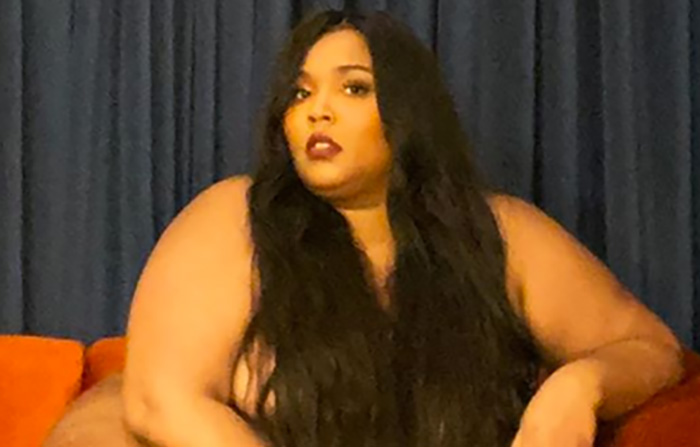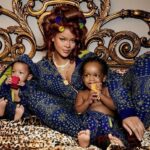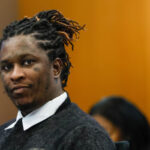All the jokes, logic and ‘breaking news’ articles in the world isn’t going to convince Rachel Dolezal — born to two white parents — that she’s anything else but a strong, Black woman.
In case you missed it, it’s been nearly 24 hours since Rachel Dolezal’s incredibly questionable (and somewhat troubling) story of being White and passing for Black has gone viral. The 37-year-old civil rights activist and head of a local NAACP chapter, was exposed yesterday for lying about pretty much everything in her life- including being Black- after walking away from an interview when the reporter asked if she was truly African-American. Rachel’s race, childhood (which she insisted was filled with memories of her parents ‘whipping her like a slave’), and even her status as a mom (her adopted African-American son is actually her adopted brother by way of her biologically white parents), all turned out to be one big farce!
Though she walked away mid-interview from CNN reporter Jeff Humphrey last night while being interrogated about her true lineage, Rachel made sure she stayed for KREM’s sit-down interview at her office this time around. And while the world waited to hear Rachel confess to being a sham, the Swedish, Czech and German woman is still adamant about the erroneous fact that she’s a Black woman. In the brief chat, Rachel explains that she views Albert Wilkerson, the African-American man she’s been posting up on her Facebook, as her real father, and that she doesn’t acknowledge her white, biological parents, Larry and Ruthanne.
Rachel also goes on to say she doesn’t like the term “African-American,” but does consider herself a black woman. o_O
On claiming her Black adopted brother ‘Izaiah’, is her son:
I think that’s between me and him. I don’t think it’s fair. It’s none of their business.
I am that I am his mom, and I do see myself [as his mom]. He’s not my brother. That’s not our relationship.
On Why She Has Chosen to Lie on the Identity of Her Real Parents
First of all, it is a very private matter especially getting into childhood pasts and family members that have had a history of litigation. Number one, I don’t think that there’s any contradiction in my mind or Franklin’s mind or Izaiah’s mind. We are a family unit. My real dad is Albert Wilkerson. That’s who I call that, and that’s all that matters to me.
I do not talk to [biological parents] Ruthanne or Larry anymore. Neither does Izaiah or other siblings.
On her race and ethnicity- ‘I consider myself Black’
I feel like the article was questioning. Really it’s Larry and Ruthanne who are questioning. So what I say to them is I don’t give two sh*ts what you guys think. You’re so far gone and out of my life.I can understand [the misrepresentation]. It’s more important for me to clarify that with the black community and with my executive board than to explain it to a community that I quite frankly don’t think really understands the definitions of race and ethnicity.
I don’t like the term “African-American.” I prefer “Black.” If I were asked, I would definitely say, “Yes, I do consider myself to be Black.” Whatever [naysayers] say, I wish I could say doesn’t effect me at all, but, unfortunately, people might listen to them or give them a platform they don’t deserve. But I have nothing to say to [naysayers].
Hmm, interesting. It sounds more or less like Rachel has chosen to go around the topic at hand, which is whether or not she actually believes she is a Black woman by worldly standards, to instead shifting the topic to the fact that she “considers” herself Black by her own terms.
Meanwhile, Rachel’s parents, Ruthanne and Larry appeared on Huffington Post Live earlier today and revealed what Rachel was like as a child and whether or not they could have predicted this type of behavior from her.
Expressing their sadness and disbelief, the married couple claims Rachel in fact had a “happy childhood,” contrary to the claims she;a made. Rachel alleged that her parents whipped her and her siblings with a baboon whip, and that the family was living in the middle of Africa, where they “hunted for food with bows and arrows.”
As for their daughter’s current mental state of health, Ruthanne asserts that Rachel’s “concept of reality wasn’t realistic.”
Catch it all on page two, including both Rachel and her parent’s interviews.
On if Rachel was always trying to “Passing for Black”
Ruthanne: She has always expressed an interest in being involved in the African American community and for causes that would benefit the African American culture. But she did not give us an indication she was going to disguise people or deceive people less to her ethnicity.
On the Racial Atmosphere in the Dolezal home
Larry: We have four adopted children. Three of them are domestic, African-American, and one from Haiti. So there are four black adopted children. [Rachel] was here or the first couple of years, then she was off to college where she was emersed into African-American culture and community in Jackson, Mississippi, and then just continued in pursuit of social justice for that community for the past 20 years.
On Choosing to Speak Up Now
Ruthanne: This whole investigation of Rachel’s ethnicity and the police involvement is due to her claims of hate crimes. When that was being investigated, that’s when all that of that came to light about her ethnicity. Because of the investigation was going deeper.
On why Rachel Has Chosen to Reject Them
Ruthanne: She wants to reject us and her identity as being our daughter. That’s the basis of her hostility towards us. Well, that hurts us deeply, and we’re quite saddened by that.
The rejection is the painful part of this. We’re very fond of our African-American friends. We’ve always enjoyed ethnicity and diversity and had friends and Rachel grew up that way. Adopting the four children was an extension of that as well. Her identification with African Americans is not hurtful to us. For her to reject us as her parents, that is what hurts. And the dishonesty is very concerning
On the “Old Rachel” and What Rachel Was Like Growing Up
Ruthanne: That isn’t the Rachel we know. The Rachel that we know is the Rachel that was always caring about other people and spoke of her family and wanted to be identified with us. She had a happy childhood and grew up in a loving home. Many people in our community would testify to that if you came here and asked around.
On Rachel’s Black, adoptive siblings and their role in this (since Rachel claims adoptive brother Izaiah as her own son)
Larry: They’re puzzled, but they’ve told us that they are basically feeling that she’s been outed. However you communicate that as a 20-year-old or 22-year-old.
Ruthanne: The children did not enjoy having to be secretive about Rachel’s identity. They were warned [by Rachel] not to let it out or blow her cover. That’s what we were told by them.
Larry: Thinking back now, [her secret] may have been the reason she’s distancing herself, and asking us not to come to Franklin’s award ceremonies or any public expression that would involve family that would show or prove her parents are Caucasian.
On possible mental health issues:
Ruthanne: Rachel has always been a very passionate and emotional person. Very driven. But not always realistic or rational. This is the most extreme in that line.
Her concept of reality itself or seeking to reinvent reality or having expectations of herself that was not realistic to herself or others. And a negative sort of view of people and family was also concerning.
Rachel’s parents also left a message for their daughter. Via mom Ruthanne, they said:
“Rachel we love you. Please tell [the world] the truth”
Rachel Defends Herself and Stands By Her Claims that She’s Black

![Da Brat Marries Judy Dupart on 2.22.22 [PHOTOS]](https://hiphopucit.com/wp-content/uploads/2022/02/1645669184565-440x264.jpeg)
![Drake Reveals Photos of His Son Adonis [Photos]](https://hiphopucit.com/wp-content/uploads/2020/03/Drake-and-on-Adonis-HHUCIT.jpg)

![Megan Thee Stallion – “BOA” [NEW VIDEO]](https://hiphopucit.com/wp-content/uploads/2024/05/Megan_Thee_Stallion___BOA__Official_Video__1_12_screenshot-440x264.jpg)
![Doechii Feat. JT – “Alter Ego” [NEW VIDEO]](https://hiphopucit.com/wp-content/uploads/2024/05/Screenshot-of-Doechii-and-JTs-Al-440x264.png)
![Young Thug Feat. Drake Drop – “Oh U Went” [NEW VIDEO]](https://hiphopucit.com/wp-content/uploads/2023/07/Young-Thug-and-Drake-1014x570-1-440x264.png)
![Rachel Dolezal Speaks Out: “I Consider Myself To Be Black” [VIDEO]](https://hiphopucit.com/wp-content/uploads/2015/06/Rachel-Dolezal-7.png)





